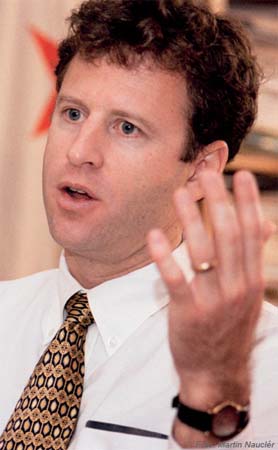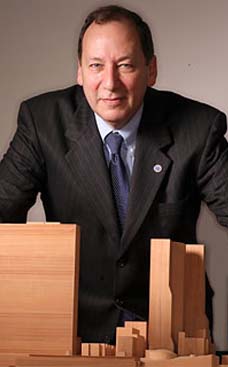
For all their agreement on matters such as Afghanistan and defense spending, President-elect Barack Obama and Defense Secretary Robert Gates are on record disagreeing over a central matter for U.S. security: the future of nuclear weapons. The issue is whether the United States should build the "reliable replacement warhead," a matter that has major ramifications for all U.S. nuclear policy, including whether to ratify the comprehensive treaty banning nuclear tests and whether we will be able to work with other countries to stem proliferation. Obama's Catch-22 appears to be to either lose the support of his defense secretary and most Republicans on a crucial arms control vote, or to reverse a campaign pledge and pursue what the world is likely to view as a renewed U.S. drive for nuclear modernization while asking others to show restraint. This double standard infuriates nonnuclear states and weakens our ability to gain support for tougher nonproliferation rules and sanctions on proliferating countries such as Iran and North Korea. Michael O'Hanlon, a Senior Fellow at the Brookings Institute and a Visiting Lecturer at Princeton University, served as a Peace Corps Volunteer in Congo Kinshasa.
Michael O'Hanlon writes: The Future Of Nukes
The Future Of Nukes
By Michael O'Hanlon
Thursday, December 25, 2008; Page A19
For all their agreement on matters such as Afghanistan and defense spending, President-elect Barack Obama and Defense Secretary Robert Gates are on record disagreeing over a central matter for U.S. security: the future of nuclear weapons.
The issue is whether the United States should build the "reliable replacement warhead," a matter that has major ramifications for all U.S. nuclear policy, including whether to ratify the comprehensive treaty banning nuclear tests and whether we will be able to work with other countries to stem proliferation.
The reliable replacement warhead, known as the RRW, which Congress has refused to fund despite repeated requests from the Bush administration, would not require nuclear testing -- in contrast to today's high-performance designs with their low margins for error. It would use more plutonium or enriched uranium, and deliver a lower explosive yield for a warhead of a given size and weight.
Gates declared his support for the RRW in October, saying that "there is absolutely no way we can maintain a credible deterrent and reduce the number of weapons in our stockpile without either resorting to testing our stockpile or pursuing a modernization program."
ad_icon
Obama, however, has been emphatic that the country would not build new nuclear warheads on his watch. He wants to reinvigorate U.S. arms control and nonproliferation efforts.
If Obama wants the Senate to ratify the Comprehensive Test Ban Treaty and commit the United States never to test weapons again, it appears that he will have to gather votes in the face of opposition from his defense secretary. Waiting until Gates leaves the Pentagon is not a good option: A review of the Non-Proliferation Treaty is scheduled for early 2010, and U.S. ratification of the test ban treaty is probably a prerequisite for strong international support to extend and strengthen the NPT.
In theory, as president, Obama could simply overrule Gates. Reality, though, is not so simple. It was no accident that Gates made his speech to the Carnegie Endowment for International Peace a week before Election Day, when rumors were floating that he might be asked to stay on. Gates apparently wanted his differences with Obama on this matter to be on the record.
And Gates's views on this are important. Not only is Gates highly regarded, but given historical Republican wariness about the test-ban treaty, Gates's hesitation would reinforce that of lawmakers. Only four GOP senators supported the treaty when the Clinton administration pushed for ratification in the late 1990s. Notable moderates voted against it, largely because of concerns about the viability of the U.S. nuclear stockpile without continued testing. Even if Obama could get the next Senate to ratify the testing ban, the issue creates a political fight he does not need.
Obama's Catch-22 appears to be to either lose the support of his defense secretary and most Republicans on a crucial arms control vote, or to reverse a campaign pledge and pursue what the world is likely to view as a renewed U.S. drive for nuclear modernization while asking others to show restraint. This double standard infuriates nonnuclear states and weakens our ability to gain support for tougher nonproliferation rules and sanctions on proliferating countries such as Iran and North Korea.
Thankfully, there is another option. The right strategy has two elements: redefine the RRW program as a remanufacture of an older design, and delay that program to allow Obama to create momentum for arms control.
Redefining the RRW might seem like semantics but is, in fact, a reasonable move. The United States developed more conservative weapons designs in the early years of the nuclear era that might be usable. Even if they had to be modified, the designs would remain more "old" than "new." Moreover, building such warheads would not create new capabilities for American war planners but would deprive them of some targeting options they possess today, while emphasizing safety and reliability.
Delaying pursuit of this remanufacturing program would not present a problem. We have little reason to think that today's nuclear arsenal is unreliable. Already, a $5 billion annual program to ensure good stockpile stewardship and reliability is monitoring weapons and remanufacturing parts that show signs of age. Bomb designers are more concerned about the arsenal 25 or 50 years from now; if we delay a few years in building more conservative designs, deterrence will not suffer.
Obama's budget request should not include money for the reliable replacement warhead, but his administration's first nuclear review should commit the United States to building more conservative and less deadly bombs by about 2015. With any luck, Gates will consider this a reasonable compromise, and with his support the United States will ratify the long-delayed comprehensive test ban treaty during Obama's first year in office.
The writer, a senior fellow at the Brookings Institution, was a nuclear weapons analyst at the Congressional Budget Office from 1989 to 1994.













